Primary and secondary schools to cut down on exams and tests, as MOE announces sweeping changes to reduce emphasis on grades
SINGAPORE — In a major move to reduce emphasis on grades, the Ministry of Education (MOE) will do away with examinations and graded assessments for Primary 1 and 2 students from next year.
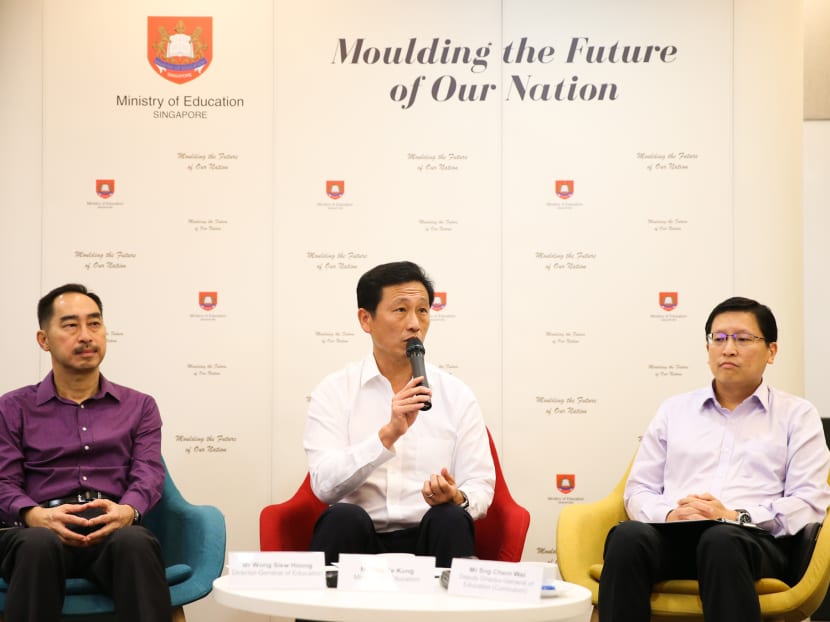
(From left) Mr Wong Siew Hoong, Director-General of Education, Minister for Education Ong Ye Kung and Mr Sng Chern Wei, Deputy Director-General of Education (Curriculum) at a press briefing at the Ministry of Education on Friday (Sept 28).
SINGAPORE — In a major move to reduce emphasis on grades, the Ministry of Education (MOE) will do away with examinations and graded assessments for Primary 1 and 2 students from next year.
Mid-year examinations for students in Pri 3, Pri 5, Secondary 1 and Sec 3 will also be removed in phases from 2019 while all students from Pri 3 to Sec 4 or Sec 5 will not have more than one weighted assessment per subject per school term.
In addition, students' report books will also no longer reflect their class and level positions as well as overall marks, with scores to be rounded off without decimal points.
These changes were announced by Education Minister Ong Ye Kung on Friday (Sept 28).
"It’s a calibrated move but yet deliberate and fairly significant. To send a strong signal that I think we are at a strong position of rigour, we can afford to unwind a bit without undermining the performance outcomes of our students," he told reporters.
"We are starting from a point of very high rigour, and likely excessive way. And by unwinding a bit, we are not doing away with… PSLE (Primary School Leaving Examination) or O Level. In fact most of the year-end examinations are still around," he added.
"I think I may have reactions from parents ‘Are you sure that is all you’re doing? Are you doing enough?’. I think I'm going to get both sets of reactions – not doing enough and are you doing too much? But that’s life."
MOE said that the move aims to free up more time in schools to strengthen holistic development, self-discovery and engaged learning.
"These changes will provide more opportunities for student-centred teaching and learning approaches," the Ministry said.
"This lays the groundwork for nurturing life-long learning attitudes and skills."
MOE will conduct a separate review on how to reduce the emphasis on grades in junior colleges, said Mr Ong in a speech at the Schools Work Plan seminar on Monday (Sept 24) when he spoke to educators and officials about the upcoming changes.
"Our engagements with junior colleges tell us there is a more complex set of issues in JCs, one of which involves preparing students well for the A-Levels in order to enroll for universities," he added.
In recent years, there has been a shift away from academic grades, with the MOE changing the Primary School Leaving Examination (PSLE) scoring system – set to take effect from 2021 – as well as increasing the Sec 1 intake for students going through the Direct Schools Admission Exercise.
The ministry has also allowed tertiary institutions to admit more students through aptitude-based admission schemes.
CUTTING DOWN EXAMS AND TESTS
Pri 1 students currently do not have to sit for the mid-year or year-end examinations, under a change first introduced in 2010.
The latest change will therefore affect Pri 2 students more, as they still have to sit for the year-end examinations.
While the learning of students in these levels will continue to be evaluated through homework and assessments, the change is that such assessments no longer count towards an overall result.
Instead of using marks and grades, schools will use "qualitative descriptors" to evaluate their learning progress, said MOE.
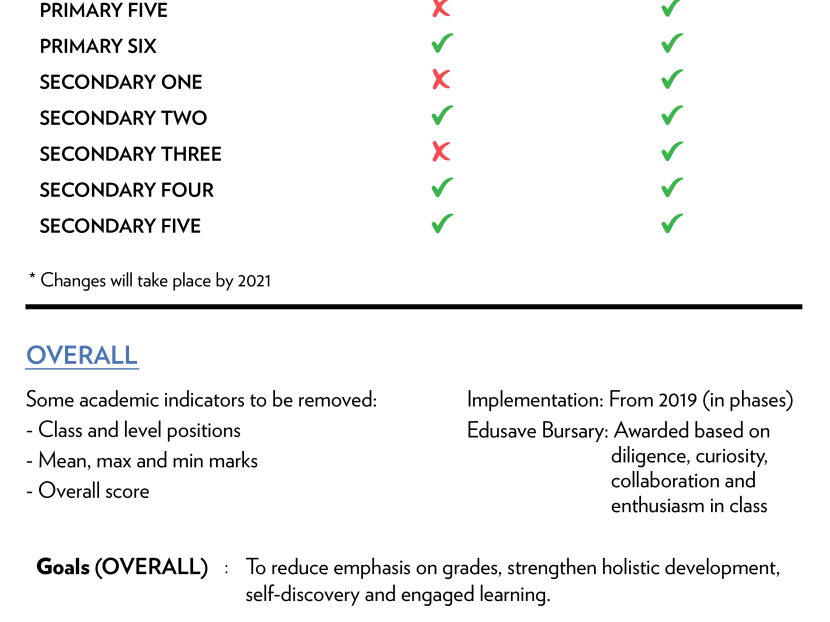
Schools will also do away with the mid-year examinations for students in Pri 3, Pri 5, Sec 1 and Sec 3, as they are in stages where they have just moved from lower to middle and subsequently to upper primary level or from upper primary to lower and then upper secondary level.
The process to axe examinations in those levels will begin over the next three years from 2019, starting with those at the Secondary 1 level.
Given that those students are in "key transition stages", removing mid-year examinations will enable them to adjust to the increased curriculum demands, said MOE.
That is because in the transition years, students have to or are offered to take up new subjects as they move to the next level of learning.
For instance, at Pri 3, students learn the Science subject for the first time, while those at Sec 1 are offered new and more subjects such as History as compared to that in the primary level.
"This can help them to manage this transition more smoothly and with greater confidence, and not feel rushed into being examination-ready just half way through the transition year," said MOE.
Removing mid-year examinations in those levels will free up to about three weeks of curriculum time for each two-year block, for instance in Pri 1 and Pri 4 or Sec 1 and Sec 2.
Schools can then use the time and space to boost the quality of teaching and learning, said MOE.
On whether doing away with mid-year examinations will in turn raise the stake of the year-end examinations, the ministry noted that schools can still conduct assessments such as class tests and projects which will still count to the overall score.
"Schools will be guided on how to assign appropriate weightings for the different assessments," it added.
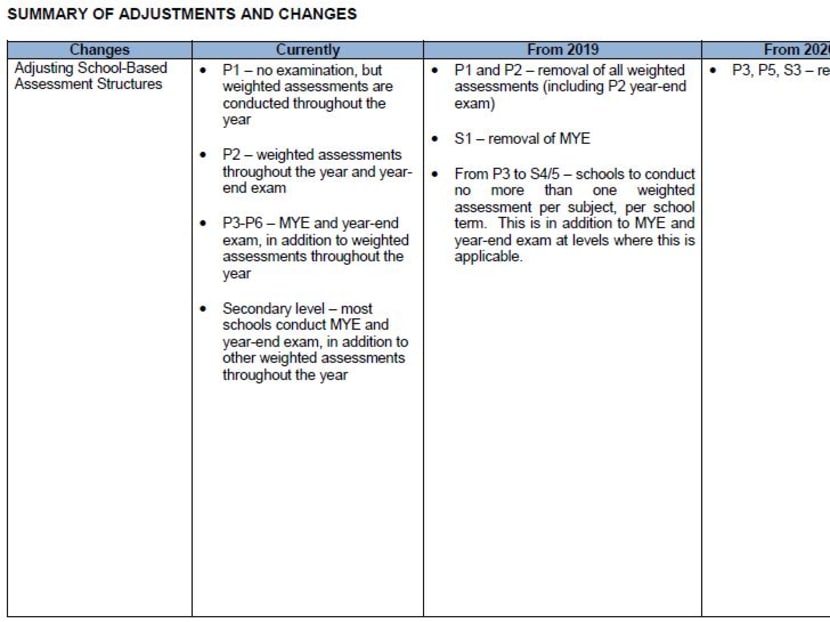
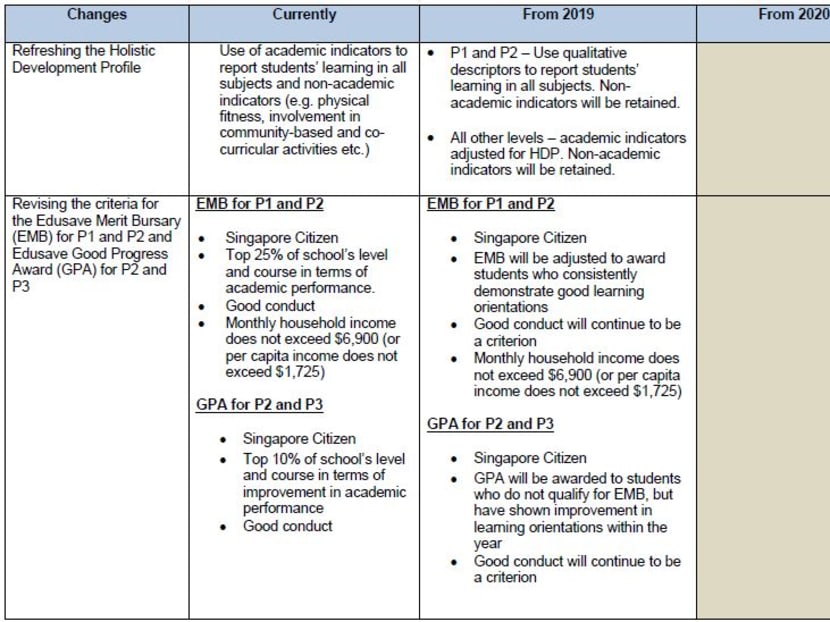
Source: Ministry of Education
CHANGING REPORT BOOKS
Currently, students' report books contain academic indicators such as class and level positions as well overall scores, with the marks of each subject broken down into decimal points.
To inform students they have failed certain subjects, the scores will also be underlined. There is also a section in the report book indicating if a student had "passed or failed" based on his or her overall score.
But from next year, students' report books will no longer contain such indicators, while scores will be rounded off.
Parents will continue to receive sufficient information about their child's progress through indicators such as subject marks and teachers' remarks which will still be included in the report books, said MOE.
Even with the changes, the ministry noted that "academic excellence is still relevant as it remains an important part of the holistic development of the student". That is why individual subject marks are still reflected though there are slight modifications, it added.
Changing the look of report books is meant to "encourage a move away from an over-emphasis on examination results and unhealthy competition, and instead, focus on developing each student according to his or her abilities", said MOE.
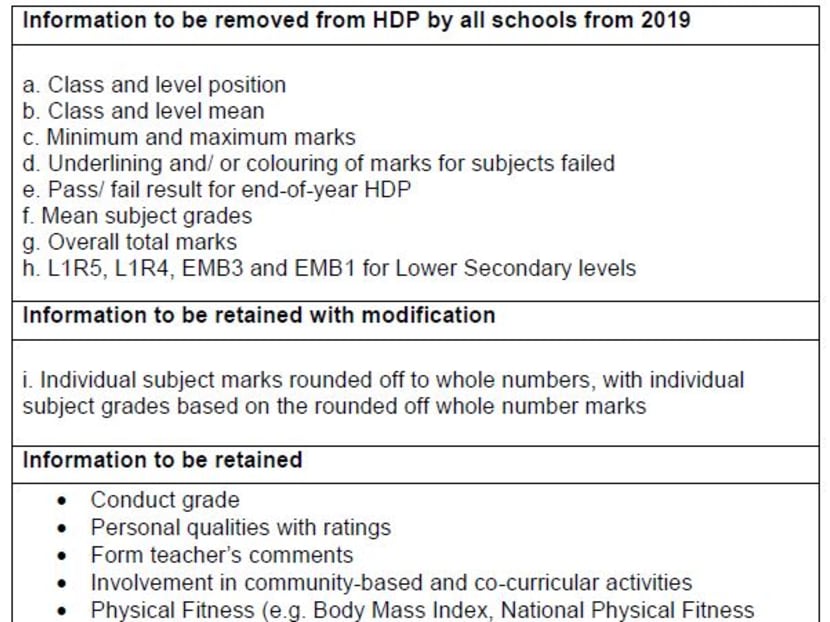
Source: Ministry of Education
REVISING CRITERIA OF EDUSAVE AWARDS
With the changes to school-based assessments, the ministry will also adjust the academic criteria for awarding the Edusave Merit Bursary to Pri 1 and Pri 2 students as well as the Edusave Good Progress Award to Pri 2 and Pri 3 students.
Under the revised criteria, students will be assessed based on factors such as diligence, curiosity, collaboration and enthusiasm in daily lessons and learning activities. More details will be revealed next January, said MOE.
Explaining why such awards will remain a fixture, the ministry said that it is "important to continue celebrating students' learning attitudes" at the lower primary level and then recognising academic excellence when they are older.
Sign up for TODAY's WhatsApp service. Click here:









